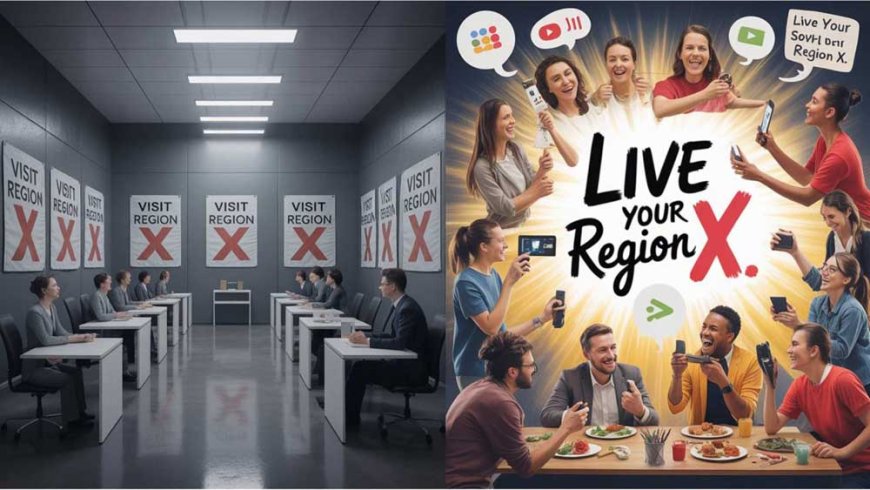Sharism and State Subsidies for Social Media Communication: Why This Is Not the Way to Promote a Territory
Sharism and Public Communication: A New Way to Promote Local Territories. State-funded social media campaigns are no longer enough to promote local regions. Discover how Sharism — a participatory, community-driven model — can transform public communication through authentic storytelling and citizen engagement.

In the digital era, communication has transformed profoundly. Social media platforms empower every individual to be both a consumer and a creator of content. Yet, paradoxically, many government administrations continue to rely heavily on state-funded, top-down social media campaigns to promote their territories. These campaigns, while often costly and well-produced, tend to fall short in creating authentic engagement or lasting impact.
This is where the concept of Sharism offers a refreshing alternative. Sharism is a digital philosophy that values open sharing, collaboration, and the empowerment of communities to tell their own stories. It stands in contrast to traditional, centralized communication funded by subsidies that often end up diluting the genuine voices of the territory.
The Limits of State-Funded Social Media Campaigns
Public administrations typically allocate substantial subsidies to external agencies or companies tasked with producing and disseminating promotional content about a region or city. These campaigns are designed to attract tourists, investors, or improve the public image of the territory. However, their nature and execution often lead to:
- Generic Messaging: Designed to appeal broadly, these campaigns frequently resort to clichés or overly polished narratives that lack specificity and uniqueness.
- Top-Down Communication: They tend to speak at the audience rather than with the community, reducing the sense of connection and authenticity.
- Exclusion of Local Voices: The real people living and working in the territory—artisans, families, small business owners—are often sidelined or portrayed as passive backdrops rather than active protagonists.
These factors result in content that may generate short-term visibility but rarely fosters meaningful, long-term engagement or community pride.
Sharism: A Model for Participatory, Collaborative Promotion
Sharism encourages a shift from this hierarchical model towards a horizontal, participatory, and distributed approach to communication. Instead of investing large sums in professionally produced ads, public resources would be better spent in enabling the people within the territory to become storytellers themselves.
This approach includes:
- Encouraging Local Content Creation: Providing tools, incentives, and platforms where citizens, artisans, and entrepreneurs can share their authentic experiences and narratives.
- Building Collaborative Digital Spaces: Utilizing platforms such as iTV+, local hubs, or social networks designed to facilitate community storytelling and peer-to-peer sharing.
- Offering Digital Literacy and Training: Ensuring that all community members have the skills needed to communicate effectively in digital environments.
- Implementing Ethical Curation: Leveraging community-based moderation and transparent algorithms to prioritize meaningful, locally relevant content over paid advertisements.
Through Sharism, communication becomes a shared endeavor where everyone contributes and benefits, rather than a monologue imposed by official institutions.
A Concrete Example: From “Visit Region X” to “Live Your Region X”
Imagine replacing a standard, agency-driven campaign slogan like “Visit Region X” with a campaign called “Live Your Region X.” This new initiative would:
- Invite residents to upload photos, videos, and stories about their daily lives, traditions, favorite places, and personal experiences.
- Engage local influencers and cultural figures to co-create content and moderate community discussions.
- Integrate schools and youth organizations to foster creativity and digital storytelling skills.
- Use community interaction to organically increase the visibility and attractiveness of the territory, creating a sustainable narrative economy based on trust and authenticity.
Towards a New Paradigm in Territorial Promotion
State subsidies for social media communication, while well-intentioned, often reinforce a protectionist and centralized communication model that is increasingly ineffective in a digital, participatory world. Sharism offers a way to democratize how territories tell their stories, opening space for diversity, transparency, and real engagement.
True promotion happens when a territory is not just marketed for but actively told by its people. This is not something that can be bought with subsidies alone—it must be cultivated through trust, collaboration, and shared responsibility.
It is time for administrations to rethink their communication strategies and embrace Sharism as a means to empower communities, enrich narratives, and truly promote their territories in a way that resonates and endures.
What's Your Reaction?



































